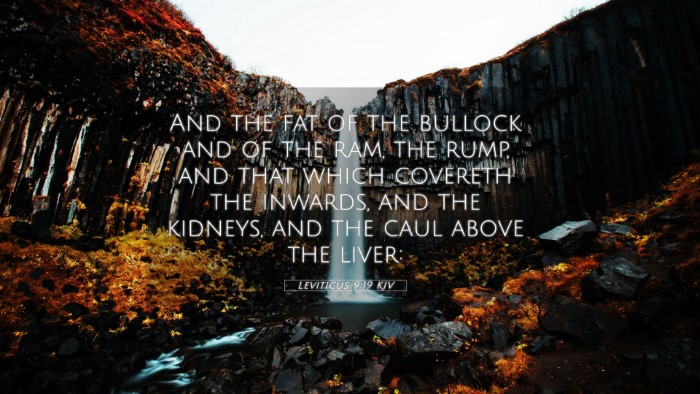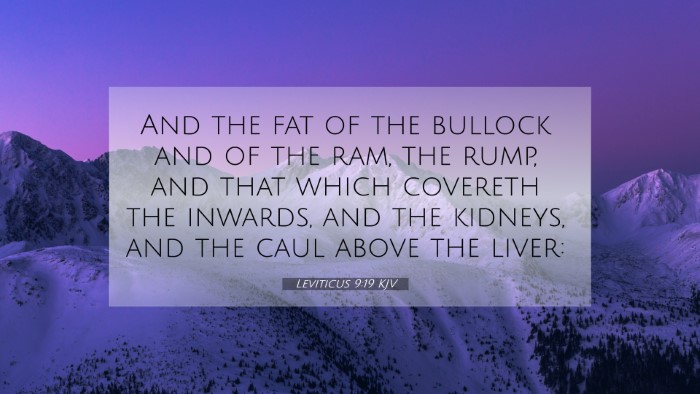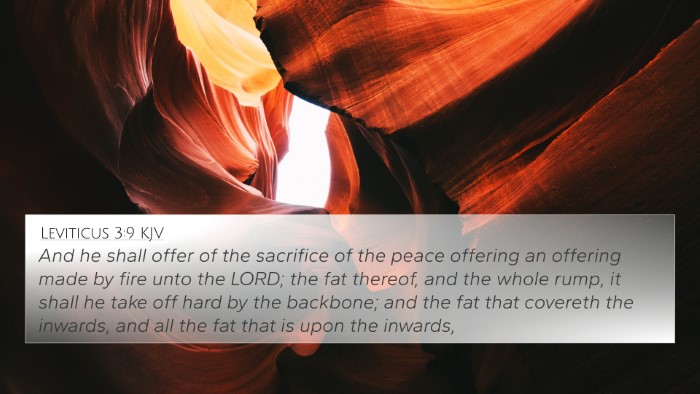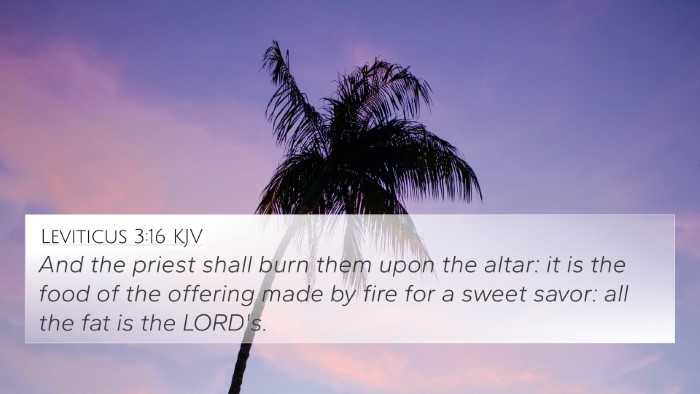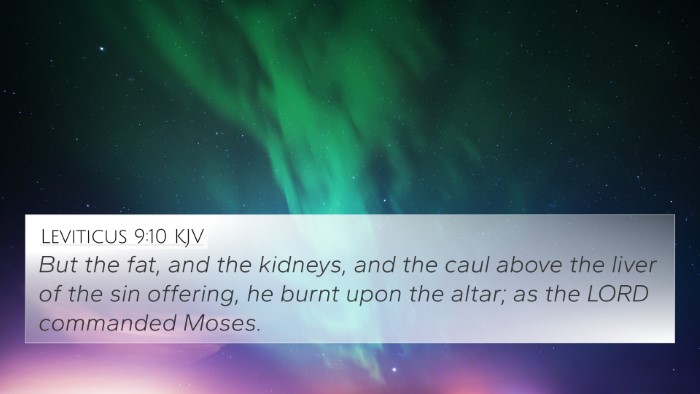Understanding Leviticus 9:19
Leviticus 9:19 describes the sacrificial acts performed by Aaron during the inaugural offerings within the tabernacle. The complexity of this verse reflects the rich symbolism and the profound implications of sacrificial rituals as presented throughout the Bible.
Verse Context
This verse is situated within the narrative of Aaron’s first priestly duties following his consecration. The actions described are part of the larger ceremony intended to atone for the sins of the people of Israel and demonstrate the seriousness of adherence to God’s instructions.
Commentary Insights
The following insights are drawn from several public domain commentaries including those by Matthew Henry, Albert Barnes, and Adam Clarke.
Matthew Henry
Matthew Henry emphasizes the importance of obedience to God's commands regarding sacrifices. He points out that Aaron's actions serve as a model for following divine instruction, demonstrating that rituals are not merely traditions, but acts of covenant faithfulness and devotion.
Albert Barnes
Albert Barnes notes that the distinction between the types of offerings (peace, sin, and burnt offerings) conveyed in this chapter underscores the various ways in which the Israelites expressed their desire for reconciliation with God. He highlights how the physical acts of sacrifice help the worshippers to understand grace and mercy.
Adam Clarke
Adam Clarke interprets the act of sacrifice described in Leviticus 9:19 as a foreshadowing of Christ's ultimate sacrifice. Clarke provides a theological reflection on how the Old Testament sacrifices set the stage for the New Testament understanding of atonement through Jesus Christ, the Lamb of God.
Significance of Sacrificial Rituals
The significance of sacrifice in Leviticus extends beyond mere animal offerings. It establishes a pattern of atonement, whereby the people of Israel acknowledge their sinfulness and God’s holiness. This theme resonates throughout both the Old and New Testaments.
Links to Other Bible Verses
Leviticus 9:19 connects with various other scriptures, illustrating the thematic continuity of sacrificial practices and their spiritual implications. Here are some related verses:
- Exodus 29:38-41: Instructions for daily offerings to God, emphasizing continual worship.
- Hebrews 10:1-4: Discusses the inadequacy of the Old Testament sacrifices compared to Christ's sacrifice.
- Romans 12:1: Calls believers to present their bodies as living sacrifices, a spiritual response to God.
- 1 Peter 1:18-19: Compares Christ's sacrifice to the unblemished lambs of the Old Covenant.
- Isaiah 53:5: Foreshadows the suffering servant and his role in redeeming humanity.
- Ephesians 5:2: Encourages believers to walk in love as Christ loved us, offering himself as a sacrifice.
- Leviticus 16:15: The Day of Atonement, which emphasizes the need for atonement and God's forgiveness.
- John 1:29: John the Baptist identifies Jesus as the Lamb of God who takes away the sin of the world.
Thematic Connections
Surveying the breadth of biblical texts, it's essential to see the connections between the theme of sacrifice and God's redemptive narrative.
- The theme of atonement parallels between Levitical law and New Testament teaching highlight the continuity of God's redemptive plan.
- The concept of blood, as representing life and a means of atonement, runs throughout the Scriptures.
- Recognition of one’s need for sacrifice forms a pivotal part of the Christian faith, echoing both the Old Testament practices and the New Testament fulfillment in Christ.
Conclusion
Leviticus 9:19, while appearing on the surface as a commanded ritual, layers a deeper theological and sacrificial understanding. Through the combined insights of public commentaries, cross-referencing with biblical texts, and exploring thematic connections, one can appreciate the enduring significance of sacrifices and their connection to the broader narrative of Scripture.
Additional Study Tools
For those interested in further exploration, consider utilizing the following study tools:
- Bible Concordance: Look up terms and find related verses.
- Bible Cross Reference Guide: Navigate connections within the Scriptures systematically.
- Cross-reference Bible study: Methods for studying the Bible with a focus on interconnected verses.
- Detailed Cross-reference analysis: Delve deeper into specific verse comparisons, particularly between the Old and New Testament.
FAQs About Cross-referencing Bible Verses
What verses are related to Leviticus 9:19?
The verses listed previously provide a foundational understanding of related scripture concerning sacrifice, atonement, and their meanings across both testaments.
How do Leviticus 9:19 and Hebrews 10 connect?
Leviticus details sacrificial systems while Hebrews explains their ultimate fulfillment in Christ, revealing the progression of God's salvific plan.

